Disclosure: Meeple Mountain received a free copy of this product in exchange for an honest, unbiased review. This review is not intended to be an endorsement.
Buru is a tight game of resource management, hidden bidding, and balanced decisions all packed into five short rounds. Crafty Games has partnered with Ketchup Games, an Indonesian game company and an Indonesian artist to produce a game that respectfully honors the history and beauty of the region.
In Buru, you are an ancient noble of an Indonesian archipelago paradise. Arriving on the island, you seek to gain Esteem in order to become the next governor of Buru. Esteem is gained through several means, each requiring resources and the ability to make use of them. However, you must act quickly as Buru ends after five short rounds.
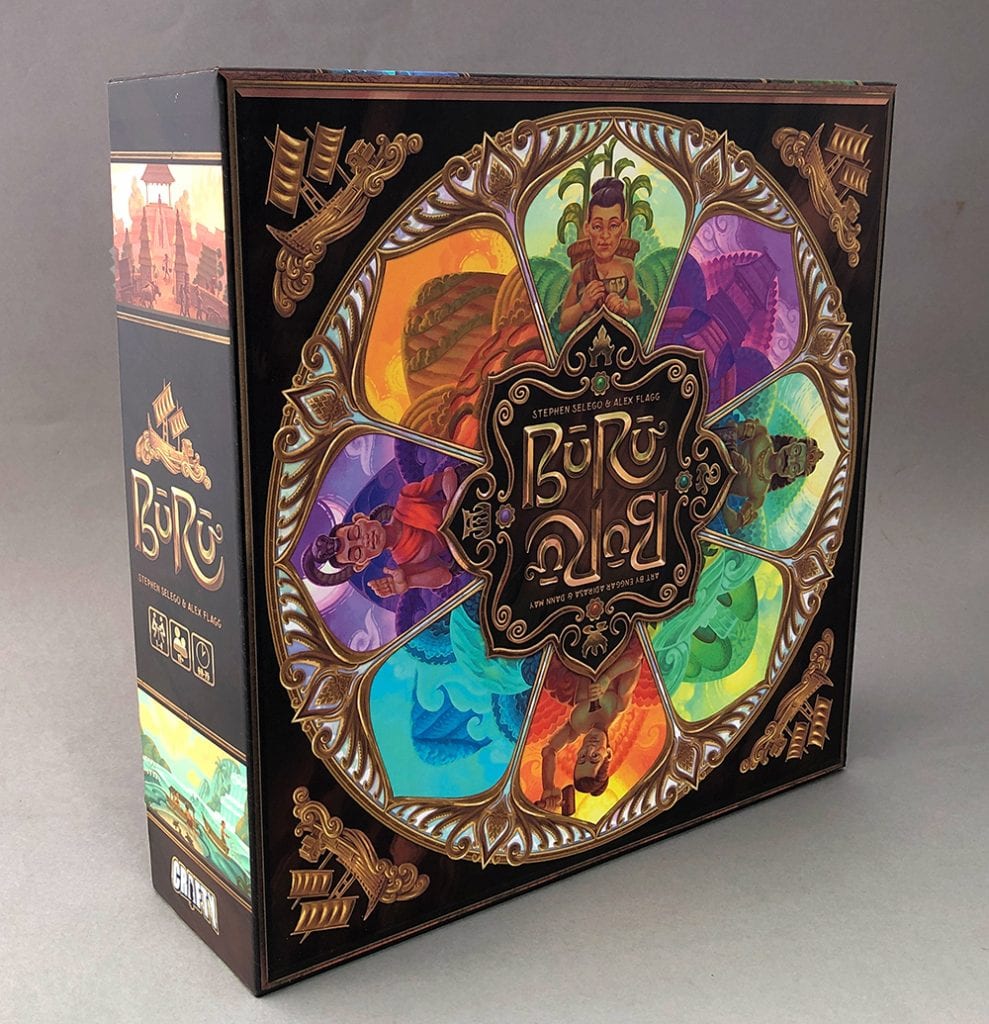
The Setup
Each player starts the game with their own player mat, with two fish tokens, and five double-sided Explorer tokens (which I’ll get to shortly).
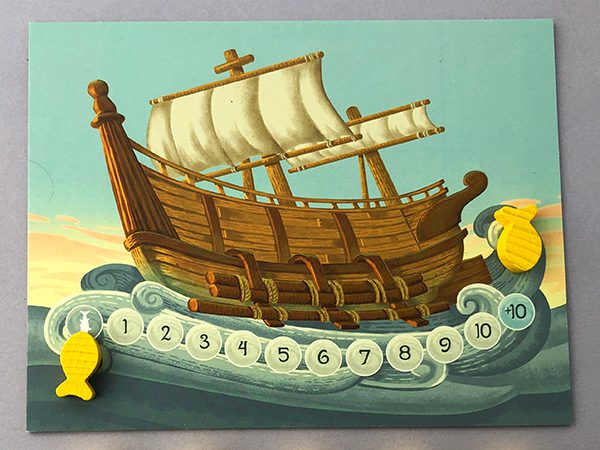
Then set the board in the center of the table.
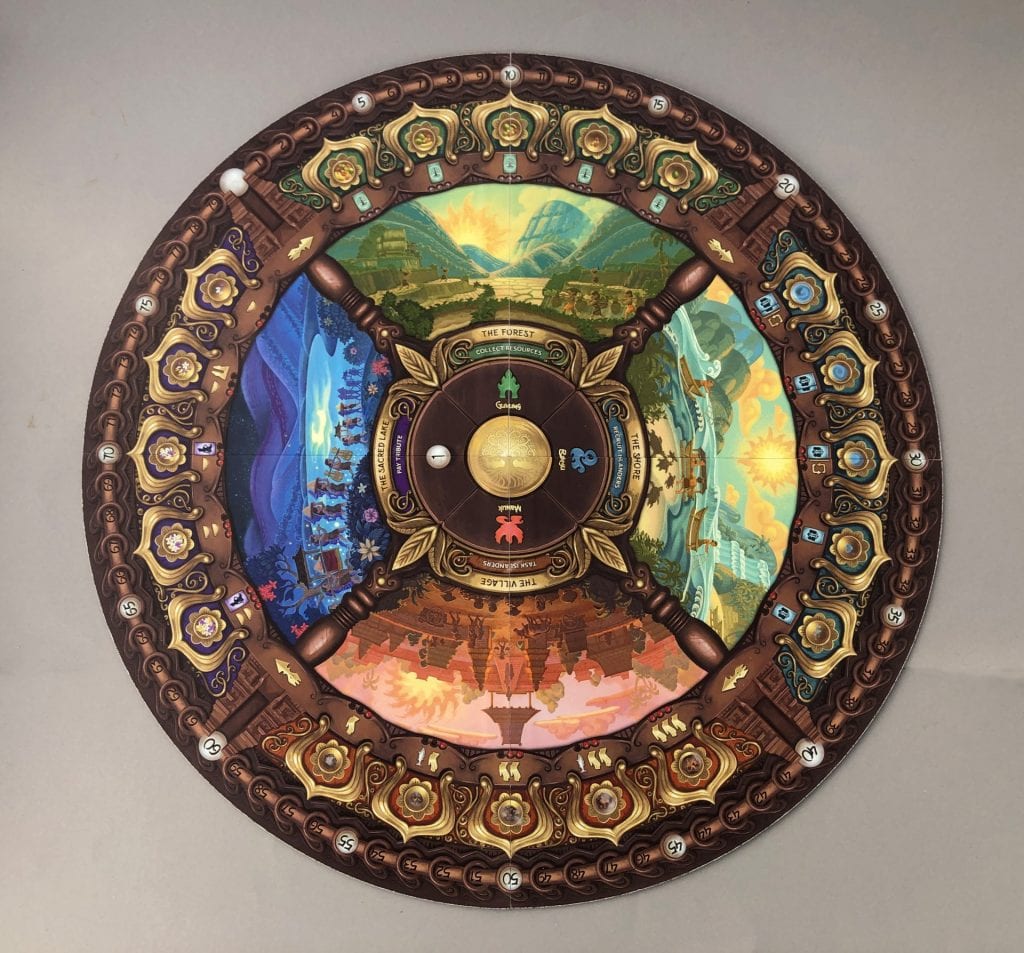
They then place their Esteem marker on the Zero spot on the outer rim of the board. As well, 10 of the circular Decree tokens are placed in the center of the board.
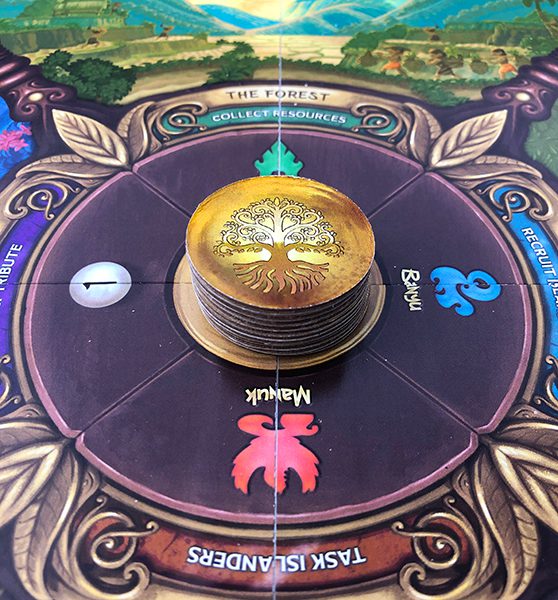
Then place the three Spirit totems on their corresponding section of the board.
Around the board you’ll place the three resources of Buru: Clay, Palm, and Ebony.

To one side you’ll set up the Altars of the three great Spirits of Buru along with their corresponding Reward cards.
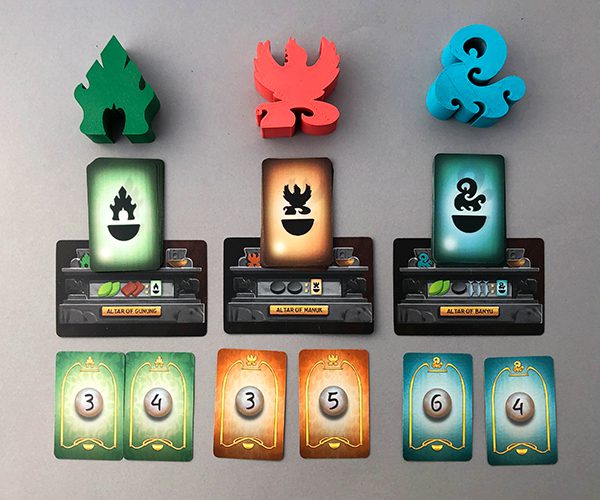
The Elder cards should be placed close to the section of the board for The Great Lake.
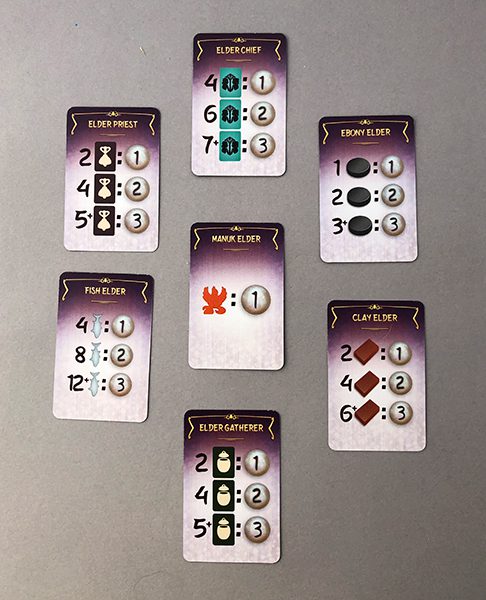
And the Forest cards should be placed near The Forest section of the board.
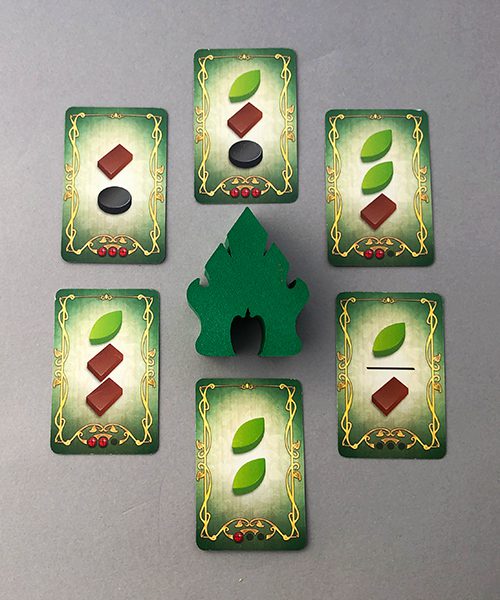
Then place the Islander cards in an area large enough so the deck and three cards can be displayed.
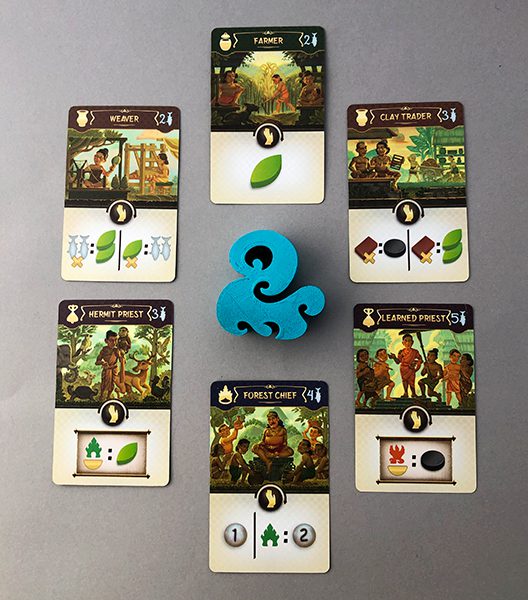
Reveal Forest cards equal to the number of players (with Solo and two players using 3 cards). Then reveal three Islander cards. Finally, reveal the top two Decree tokens and place them in their corresponding area on the board and/or Altar.

The most diplomatic player starts the game and takes the First Player Token. The other players each place one of their fish tokens on the 3 spot on their player boards.
Throughout the game, play proceeds clockwise from the starting player.
Playing the Game
Players start by taking turns placing their Explorers in one of the four regions of the board. Before doing so, it’s important to look at the underside of these Explorer tokens.
Your Explorers are each worth points, 1 through 5, as indicated on the obverse of the Explorer icon. These numbers are important—and important to keep secret—because Buru is also a secret bidding game. The first player may be the first to place an Explorer in a region, but the player with the highest number will decide the turn order within those regions. (You can place more than one Explorer in a region.)
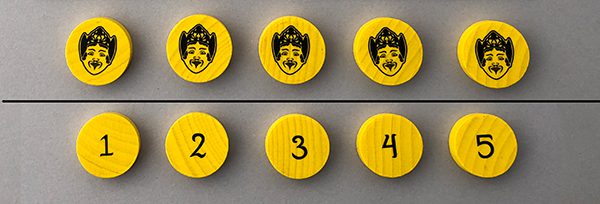
Going first in each region has definite benefits as the actions in those regions typically decrease in ability.
Each player takes note of the numbers of their Explorers. Then, in turn, each places four of their Explorers on the board, face-up.
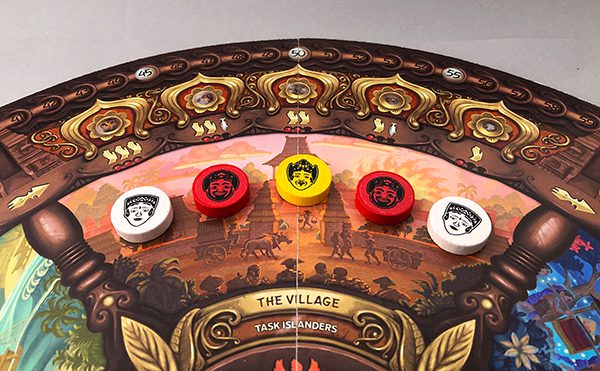
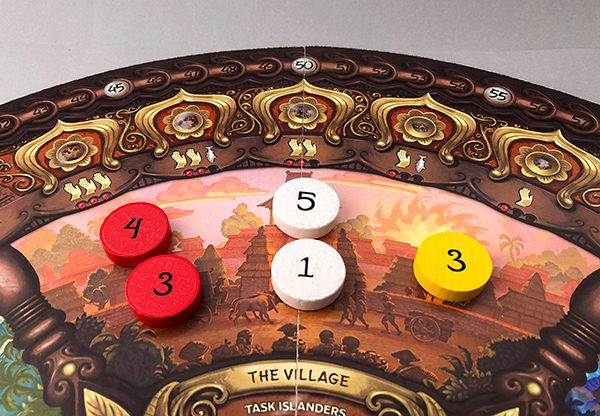
The fifth Explorer is left on your player board to show how many Fish—the standard currency of the game—you’ll add to your inventory for this round. Fish are needed to recruit Islanders and for Tributes to some of the Island Spirits.
Players start by turning over this fifth explorer and moving their fish token up the track at the bottom of the board to indicate their total number of Fish.
Then, players turn over their Explorers in The Forest region.
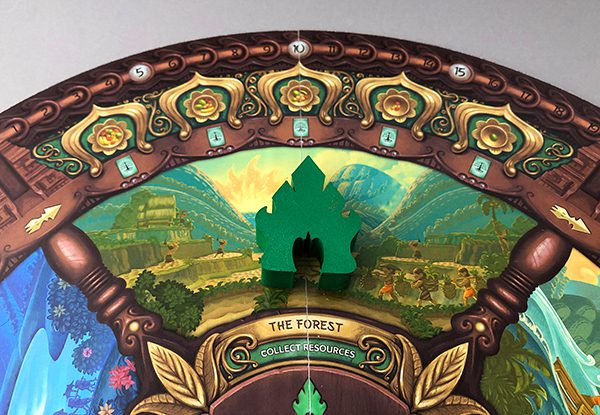
The highest bid here gets first choice of the resources associated with the revealed Forest cards. Not surprisingly, some Forest cards grant you far more resources than others.
As players claim a Forest card, they are traded in immediately for the resources shown. Those resources are placed on their player board for later use.
The next region to be resolved is the Shore. Here you can recruit either one or two Islanders from the available cards, or remove the face-up cards in favor of three new cards.
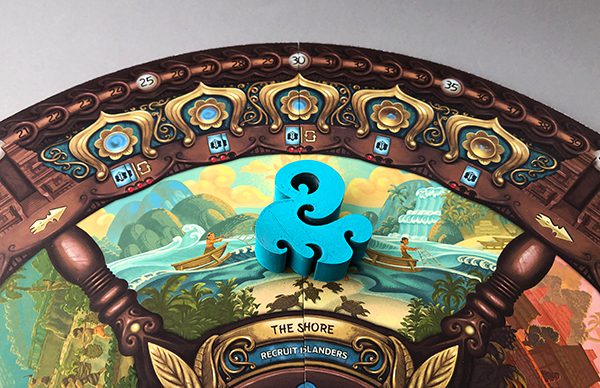
Recruiting an Islander isn’t free. You must pay the amount of fish shown on the Islander’s card in order to recruit them.
This cost is relative to the benefit the Islander provides. For instance, an Islander who grants you a single Palm resource will only cost you a few fish. The Islander who allows you to pay Tribute to one of the Island Spirits for free will cost you considerably more fish.
Players then move on to the Village. This is where you can activate your Islanders to gain the benefits they offer.
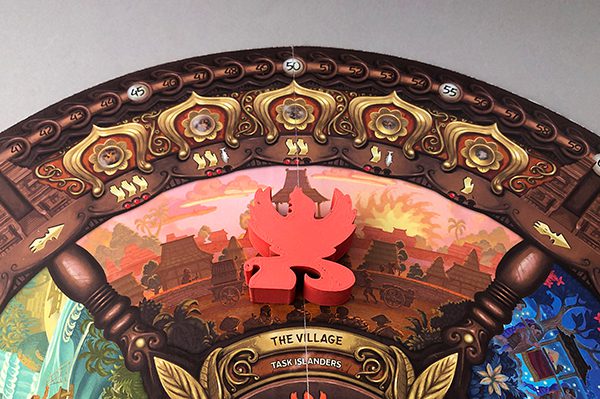
Depending on how high your bid is, you can activate up to three Islanders. Others only allow you to activate one or two Islanders. Two of the slots also gain you a fish.
Finally, players end the round at The Sacred Lake. Here you may trade in the required resources to pay Tribute to the Island Spirits and gain the Esteem necessary to win the game.

The various slots available in The Sacred Lake allow for making one or two Tributes, claiming Elder cards, and taking the first player token.
While the other two are self-explanatory, the Elder cards are worth mentioning. A player draws two Elder cards, then chooses one to keep. These cards will have specific ways in which you can earn extra Esteem at the end of the game, often through some sort of set collection (specific types of Islanders, increasing amounts of Ebony, etc.). You’ll keep these Elder cards hidden from your opponents.
Having the highest bid in a region has two additional benefits:
If one of the two Decrees per round is in that region, you immediately claim the bonus indicated.
You also claim the Spirit Totem for that region.
Why collect a Spirit Totem? As long as you hold a Spirit Totem, any time a player (including you) makes an offering to that Spirit, you get an additional Esteem. It’s a way of getting free Esteem that shouldn’t be overlooked.
Ties and First Player
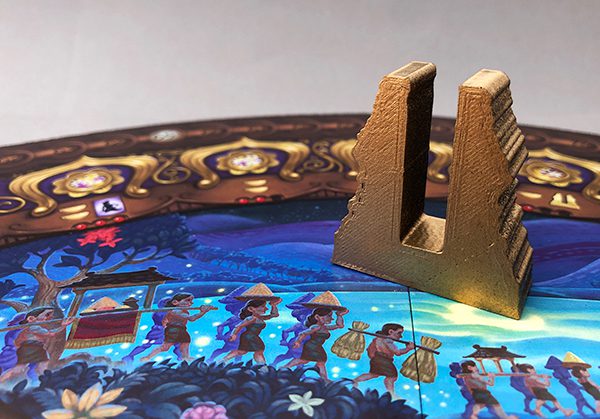
You might think with whoever bids the highest in a given region going first, that having the First Player Token is unnecessary. That would be, if it weren’t for the way Buru breaks ties—and ties can be very common when bidding on a region. If you have the First Player Token, you automatically win any tie. If not, then ties go to the player closest to the first player moving clockwise around the table.
But Wait! There’s More…
Buru’s Kickstarter campaign will launch with two expansions: Ukum and Ambelau. Here’s a look at what they add to the game.
Ukum
The Ukum expansion adds an Ukum Spirit Altar (and its accompanying ten Tribute cards), two Elder cards, one extra Decree token, nine new Islander cards, a new Decree area for the playing board, and the Ukum Spirit token.
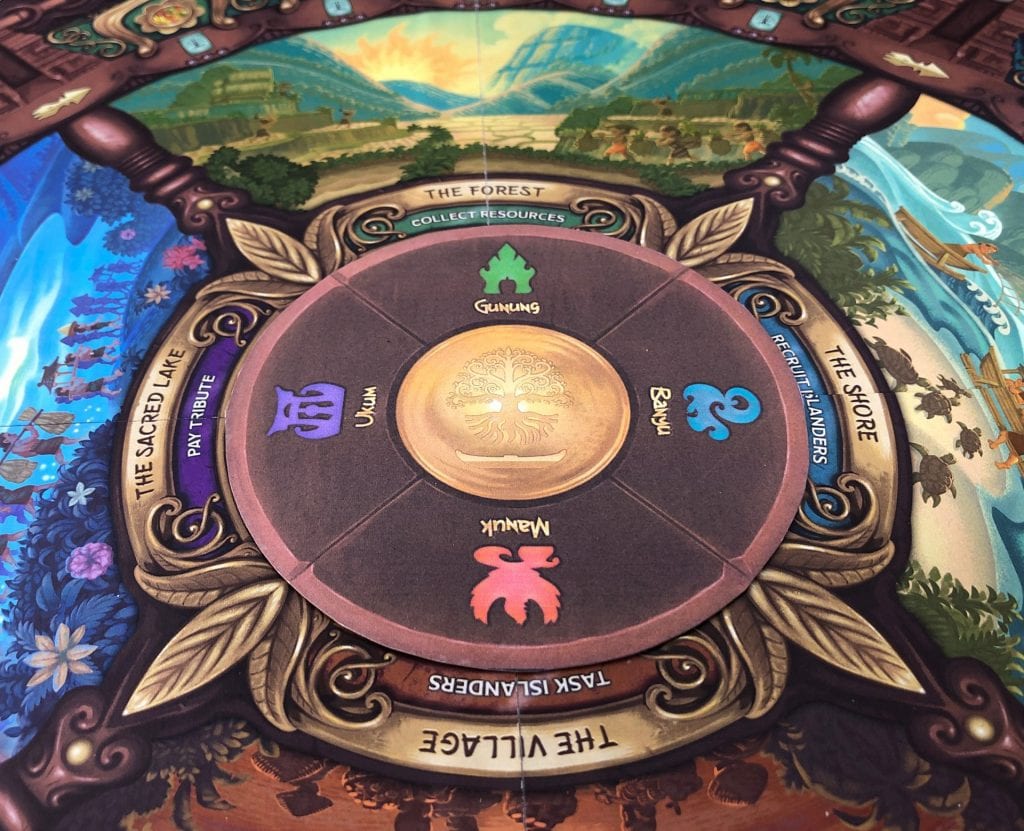
The new Decree area sits atop the base game Decree area and adds the Ukum Spirit token into the game. Now if you’re the highest bidder in the Sacred Lake region of the board, you get to claim the Ukum token.
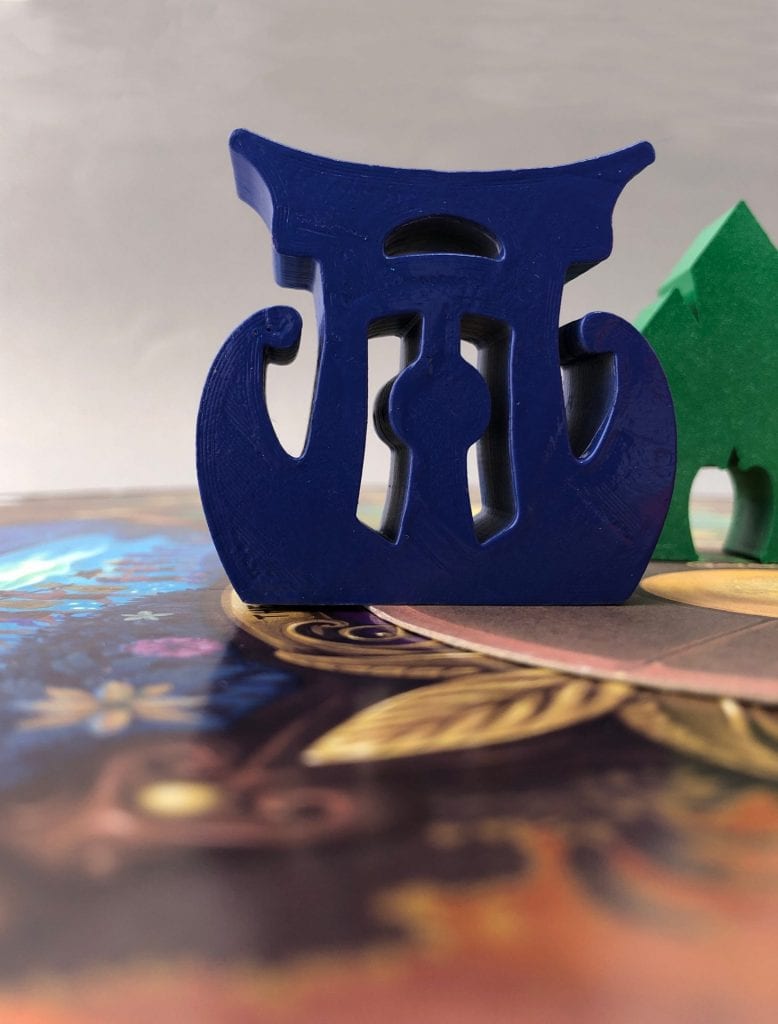
This allows you to gain an Esteem any time a player pays Tribute to the Ukum Spirit.
The Ukum Spirit is one of peace and harmony. As such, Tributes to Ukum work a bit differently. Instead of trading in resources, Ukum wants you to rid the island rid of its outcasts and thieves. These enter the game through the nine new Islander cards.
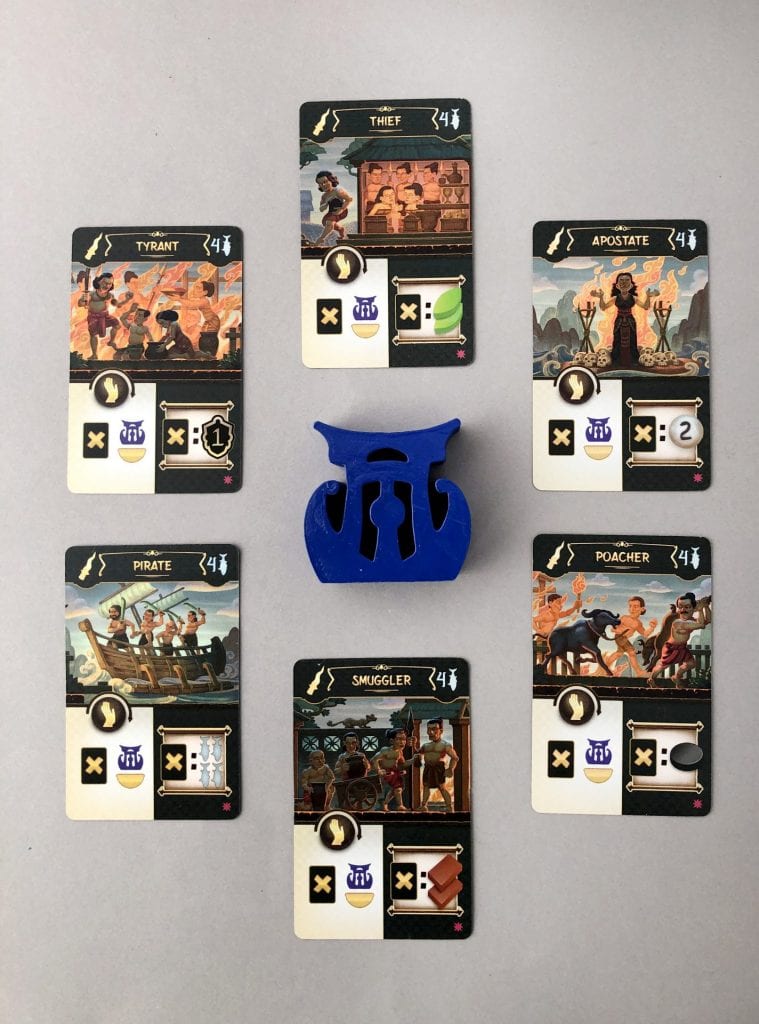
These troublemakers are acquired from The Shore during the standard Islander phase. When a player activates them during the Village phase, two things happen: That player takes an Ukum Tribute card, and turns the Islander card in for the resources listed on the right-hand side of the card.
Paying Tribute to Ukum is easier than paying Tribute to any of the other Island Spirits. As a result, the Esteem gained from the Ukum Tribute cards will be less than those from the other Island Spirits.
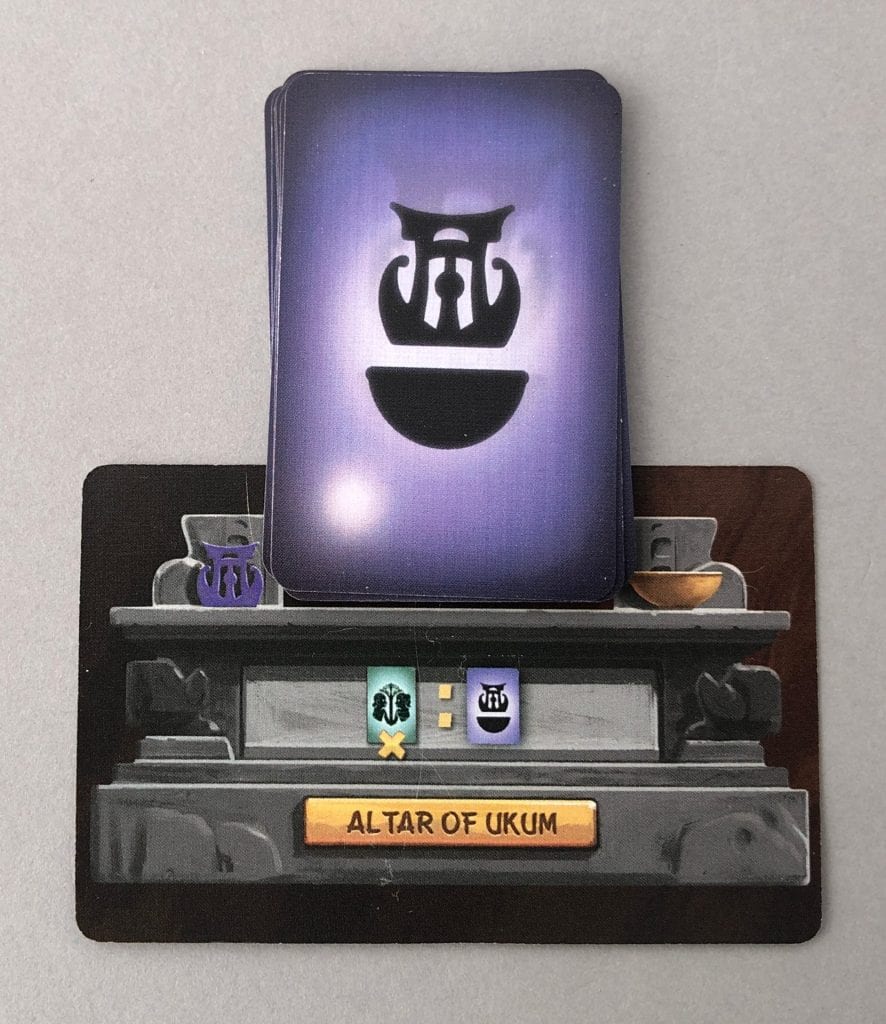
Ambelau
The Ambelau expansion comes with a new, circular board, an altar to the Island Spirit Ibu (and ten new Ibu Tribute cards), the Ibu Spirit Token, three new Decree tokens, a new Special Guide token, an Elder card, and canoe tokens for each player.
The circular Ambelau board is placed at the edge of the standard Buru board, such that the Ambelau starting area is adjacent to the 50 marker on the Esteem track. This allows for its actions to take place between those of The Village (gaining Islanders) and The Sacred Lake (paying Tribute to the Island Spirits).
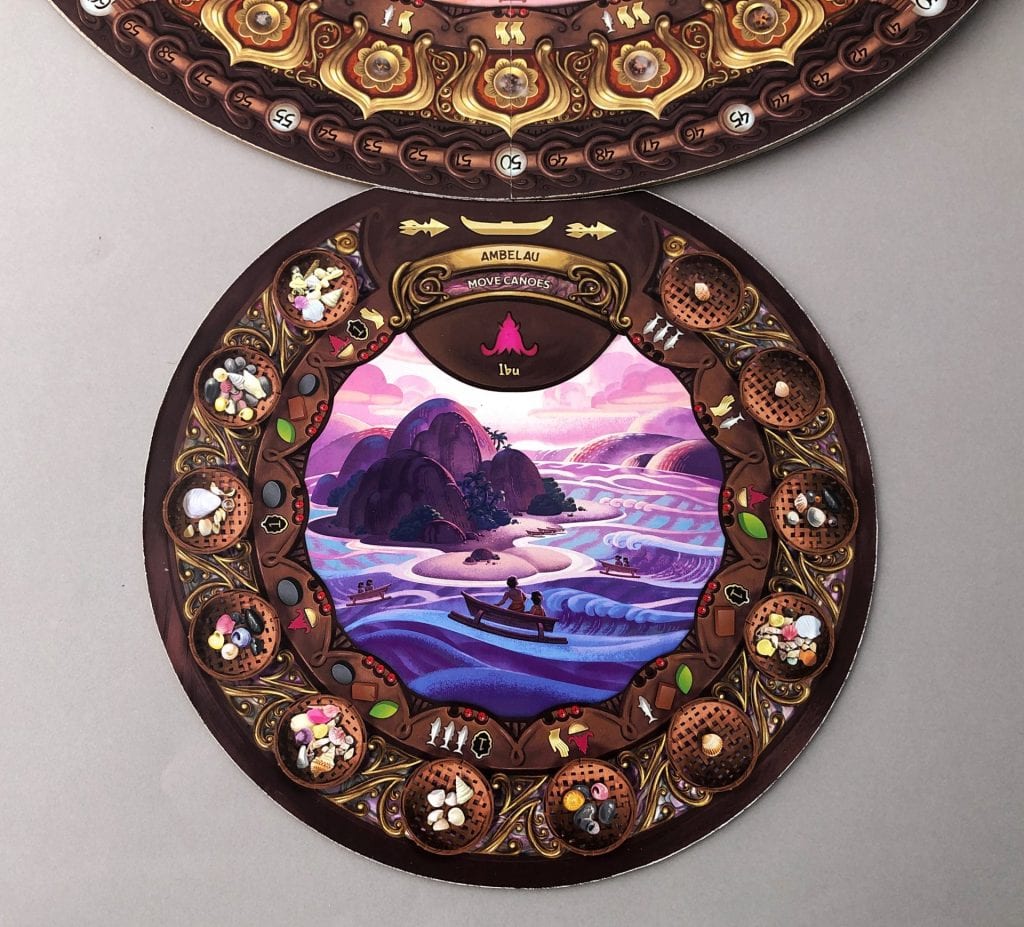
Each player places a canoe in their matching color at the starting area on the Ambelau board. The special Guide tokens (each with a value of 1) are placed to the side of the smaller board.
With Ambelau, players have an additional area to consider. Ambelau offers a welcome variety of options: some spots grant you resources, while others allow you to activate an Islander, make a Tribute to the Island Spirit Ibu (and immediately draw a Tribute card), gain fish, and/or acquire your Special Guide for the next round.
After determining the highest bidder in Ambelau, players are then able to move their canoes along the circular track based on the number on their Explorer. Players must move at least one space, but can move up to the number of spaces indicated on the Exporer used to bid on their position in Ambelau. Only one canoe can occupy a given space, however. This allows other players to skip over occupied spaces if they wish.
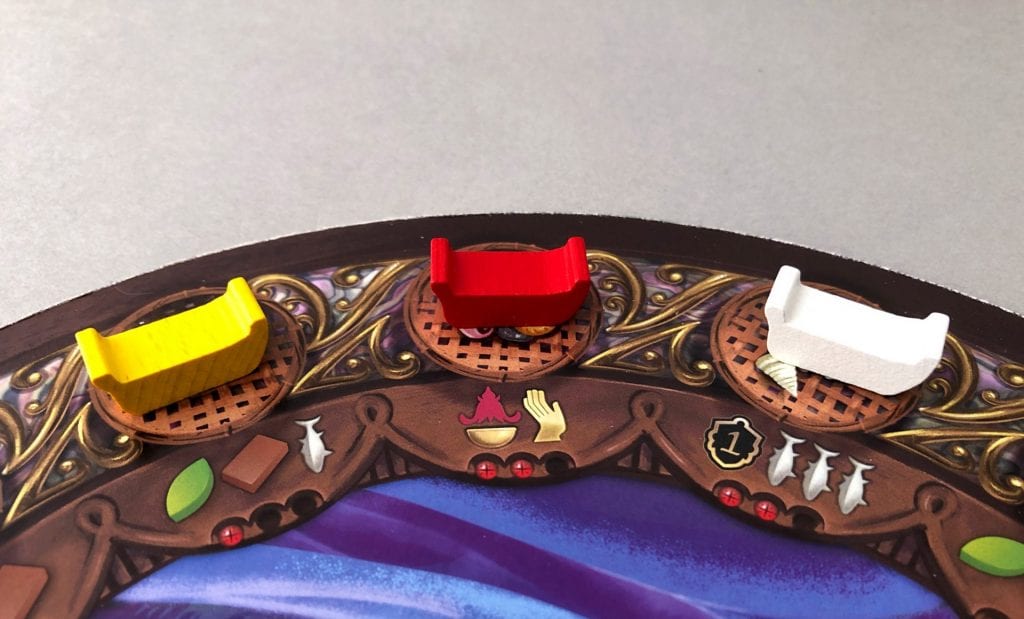
The Special Guide (a sixth Explorer) gained in Ambelau may only be worth one in the bidding race, but having an additional Guide to bid with definitely changes the bidding dynamic. Special Guides may only be used in the round after they are acquired. After that round, they are returned to Ambelau where they can be gained again on another turn.
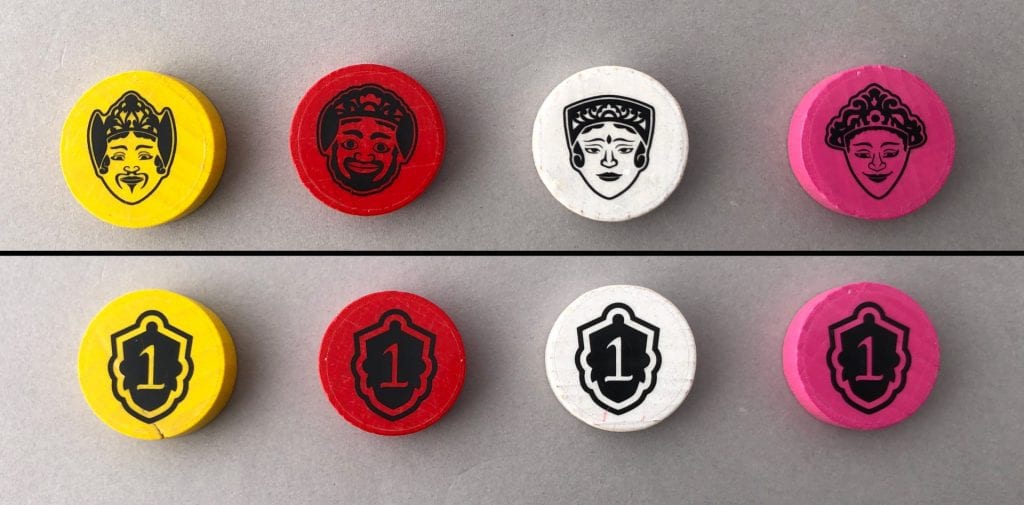
Artwork
Since the copy of Buru I’ve played is a preview copy, I can’t comment on the final production components. However, I did want to commend the Indonesian artist Enggar Adriasa and Dann May on their beautiful artwork. The main playing boards and the various Islander cards are all colorful and engaging. Knowing that they come from an artist from the area, gives the game an authentic feel that’s woefully missing from other games in this setting.
Thoughts on Buru, Ukum, and Ambelau
Buru is a game of resource management and hidden scoring. Resources are gathered, then traded in for Tribute cards. These are seen only by the player, then kept face down in front of them until the end of the game. When paying Tribute, some slots in The Sacred Lake also allow you to gain an Elder card which will earn you additional Esteem if you’re able to fulfill the Elder’s demands (typically either set collection or holding a Spirit Totem) at the end of the game.
With few exceptions, all of my games of Buru have been relatively low-scoring ones. (That the scoring track goes up to 80 is bewildering. One runaway score in the 30s was as high as I’ve seen.) All resources are only good as Tributes to the Island Spirits. At the end of the game, they hold no intrinsic value—unless they’re part of an Elder card condition.
Buru is also a short game: five rounds is all you’ll have to acquire resources and offer them as Tributes to score points. Personally, I wished I had another two rounds to better build an engine to gain the points I wished I could have accumulated.
The hidden bidding element in Buru, through the two-sided Guides, elevates the game for me. Each region of the board has its own importance throughout the game and, given that resources are typically hard to come by, bidding requires careful consideration. Also, since one of the Guides needs to remain on your own player board as your income in Fish, you have to really think about each placement. Do you play your 5 Guide in hopes of getting that great Forest resources card? Or do you use it to gain enough Fish to recruit the Islanders you’re eyeing? And if you play that 5 Guide somewhere you think is going to be contested, how close are you to the First Player? If you’re too far away, you’ll come in last in any ties.
If you really want to activate all three of your Islanders, is it worth placing two of your Guides in The Village, knowing that means you won’t be able to bid in all the other regions. (If only I’d gotten that Special Guide from Ambelau!)
In a game of sparse resources and, therefore, limited scoring opportunities, The Ukum expansion offers a bit of each through the miscreant Islanders it adds to the Islander deck. While most Islanders will cost you between 2-5 Fish, Outcasts will cost you 4 Fish. This may seem like a lot, but those 4 Fish get traded in for Esteem and resources. This makes them a good deal.
It turns out Ukum isn’t very particular about who gets cast out of the Island. Towards the end of the game, if you’ve gained an Islander who wasn’t as helpful as you had hoped, you can offer that Islander up as Tribute as well. You won’t gain any additional resources, but you will get an Ukum Tribute card (worth Esteem), which is better than nothing.
The Ambelau board brings a welcome variety of options for resources. As well, the Special Guide allows you to either bid in five different regions or add a Guide to a region to boost your bidding total. Even though this Special Guide is only worth 1 in the bidding, the additional move it provides you with shouldn’t be discounted. Remember, if you’re the only player with a Special Guide, you get to place your fifth guide last. You can survey the board and place that Guide where you think it will give you the best return.
I found that playing the base game of Buru was enjoyable on its own and wasn’t sure about the expansions—until I added them. While I still think I’d teach Buru to new players with just the base game, I’d add in the two expansions after only a game or two. Ukum and Ambelau both add elements that make Buru feel less resource sparse, while making the bidding decisions that much harder.
I did find two things frustrating with Buru: the shortness of the games and my lack of ability to build a solid engine. I understand that most resource management games intentionally limit the rounds to make for a tight game (I’m looking at you, Terra Mystica!) but five rounds just doesn’t seem long enough. As well, the hit-or-miss offerings from the Forest (resource) cards and the Islanders means that your ability to offer Tributes is unpredictable. The Abstract player in me bristles against such randomness, but it may not bother other people.
If I were to play again, I’d want to extend the game by another round or two, either reusing Decree tokens or just adding in those from the expansions and not reducing the stack down to ten.
Buru remains a beautiful game that pays Tribute to the Indonesian lands and culture. It launches on Kickstarter in late April, along with the Ukum and Ambelau expansions. Keep an eye out for it!


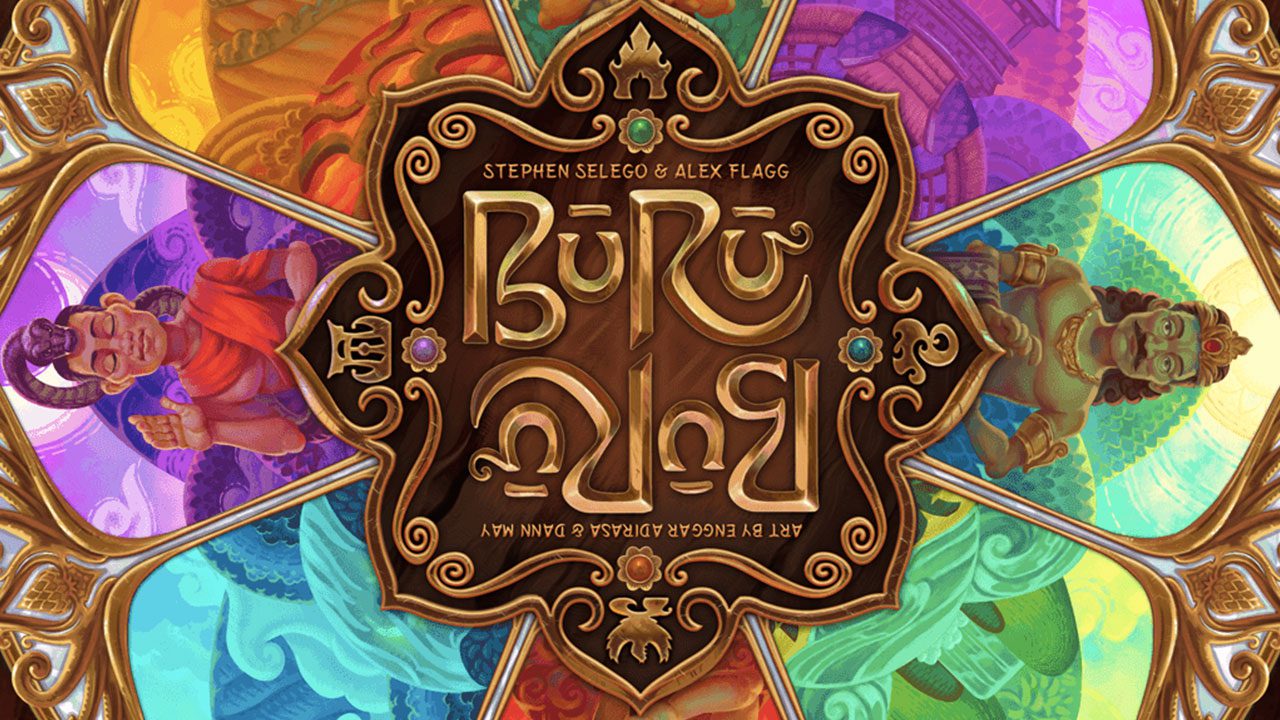








Add Comment